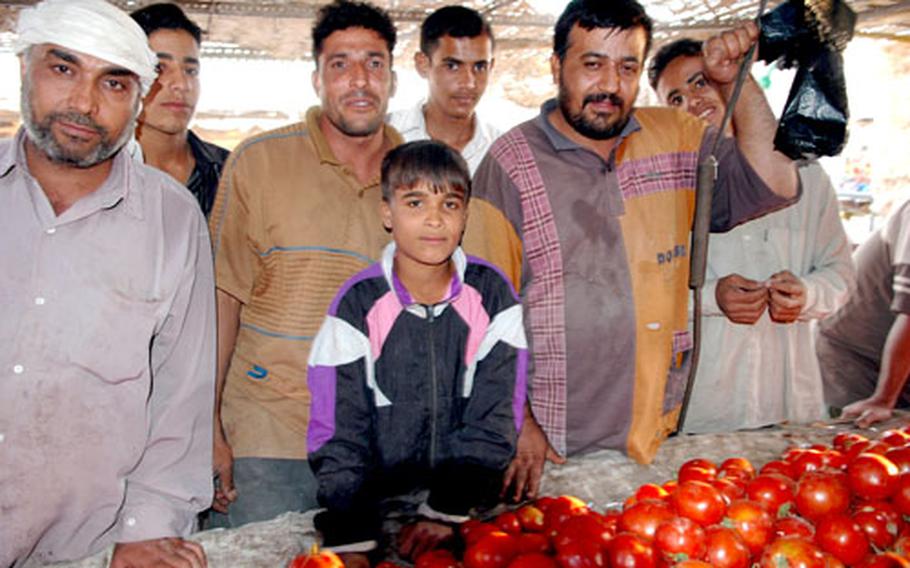
Death by tomato: That’s what vendor Radi Abd al-Hussein’s 12-year-old son, center, wants for Saddam Hussein. His father, however, was more blunt: “See you in hell,” he said. (Anita Powell / Stars and Stripes)
BAGHDAD — Most residents of Iraq’s biggest city don’t mince words when it comes to their former leader.
The trial of Saddam Hussein and seven of his associates — charged with killing more than 150 residents of the northern city of Dujail in 1982 — is scheduled to resume Monday.
A random sampling of Iraqis in and around the capital, a city that still bears numerous relics from Saddam’s 24-year rule, were asked what message they would like to give to the former dictator, if given the chance.
“I hope I see you in hell,” said tomato seller Radi Abd al-Hussein, 30, a Baghdad resident who has sold vegetables at an east Baghdad marketplace for five years.
“I want to cut his head off,” he elaborated, through a translator. “He’s a tyrant. He hurt all of the Iraqi people. All of us. In times before, we couldn’t stand here and do what we want.”
Hussein’s 12-year-old son offered a simpler message: He held up an overripe tomato and asked that it be thrown at the former dictator.
Others were less virulent, but still negative.
“Just say hi to him,” asked market vendor Kadem Mussen, 55, in Arabic. “Tell him that the Iraqi people are living worse. [But] we don’t want him to be back.”
While Hussein’s fate will be decided by a panel of judges from the Iraqi special tribunal — who have the option to confer the death penalty — the court of public opinion seems to have already settled his fate.
“Sadr City, the city that suffered, you treated them very badly, you killed their sons,” said Dhia al-Naser, 34, an accountant who lives there. “We wish you death.”
Naser offered a personal reason for his strong words:
“Saddam Hussein killed my father,” he said. “We found him in a mass grave.” When asked why his father was targeted, he shrugged his shoulders and said, “only Allah knows.”
Local leaders, too, said they’re working hard to overcome the legacy of Saddam Hussein — a legacy that affected all Iraqis.
“We’ve been suffering inside,” said Taha Bushra, 40, deputy chairwoman of the Karada district advisory council in east Baghdad. “Our hearts have been burned.”
An Iraqi media analyst, who asked that his identity be protected because he works with the Americans, said such feelings of hatred against the former leader are the norm in Baghdad. He estimated that 80 percent of people in Baghdad harbor ill will against the former dictator.
“In watching Arabic television, I see them asking people what they think about the trial,” he said in English. “They say, ‘Deliver Saddam to me. I want to cut him into pieces.’”
But the analyst said he also had encountered people who aligned themselves with rebel leader Muqtada al-Sadr, who has urged Iraqis to fight against Americans.
“I told him, ‘You should have fought Saddam,’” he said. “He said, ‘We are not afraid of U.S. forces. We were afraid only of Saddam.’”
He said that many people in Iraq wish for a speedy resolution to the trial, and that most want the same outcome: “The majority of people think that Saddam should get the right punishment, which is, of course, the death penalty.”
“In my opinion, there is no punishment for Saddam,” the analyst said. “He did so many crimes. He killed so many people. Death is not enough for him.”